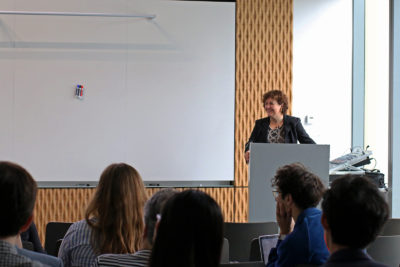
The Boston University Center for the Study of Europe hosted a presentation on Monday afternoon in which Michèle Lamont, a Harvard University professor of sociology, discussed issues with stigma and discrimination in the modern world.
The colloquium room in the lobby of the Rajen Kilachand Center for Integrated Life Sciences and Engineering was filled nearly to capacity with over 30 people interested in hearing about the award-winning speaker’s research – the first lecture in a new series of presentations offered by the Center for the Study of Europe, according to Elizabeth Amrien, the Center’s assistant director.
“Our fall theme is discrimination against vulnerable populations, and the strategies used by these populations to defend against attack or to develop a collective sense of self-worth,” Amrien wrote in a Facebook message. “Lamont explores how stigmatized groups respond to discrimination and exclusion … This work gets at the heart of how people who are beaten down stand up to injustices.”
Lamont’s lecture focused on themes similar to those in her new book, “Getting Respect: Responding to Stigma and Discrimination in the United States, Brazil, and Israel.”
Lamont discussed the issues of racism, sexism and discrimination toward people of various sexualities, gender identities and religions in the United States, Brazil and Israel and compared and contrasted the ways in which people in those countries respond to stigmatization.
“When we want to understand inequality,” Lamont said, “we have to consider distribution and recognition together. Inequality is a deeply multidimensional phenomenon, so we really need to broaden our analysis to better capture how it operates.”
Destigmatization, Lamont said, is a process that takes time and understanding — something she hopes society can achieve in the near future.
“Destigmatization is an accomplishment … to result in major changes in public attitudes toward groups, which we can see clearly in survey data,” Lamont said. “So, in other words, this is a social process. If we understand better the conditions through which groups are destigmatized, we can help try to activate them to result in the destigmatization of new groups.”
Lamont told the audience members to think critically about how they see the world in order to move closer destigmatization.
Several of the people who went to listen to Lamont’s lecture said they were interested in hearing about how inequality and discrimination affect various groups of people.
Political science professor Sofia Perez said she had been eager to hear about Lamont’s new book and she liked learning about the distinctions Lamont made among different types of stigmatization.
“Michèle Lamont is the author of some of the most original research on how people self-identify,” Perez said. “What I found particularly compelling is that she drew a contrast between three kinds of stigmatizations in our society.”
Kit Man, a first-year doctoral student in the Graduate School of Arts and Sciences, said he enjoyed listening to her talk about racism in a social context.
Man, who studies ethnicity and nationalism within a Chinese context, said he liked hearing Lamont talk about “how racial boundaries are formed in societal context, within a resting context.”
Felipe Franke, a doctoral student from Florianópolis, Brazil studying sociology. He is spending this year as a visiting researcher in GRS, and he said he went to the presentation to hear Lamont talk about racial issues in Brazil.
“The talk was about my country at some levels,” Franke said. “I decided to come here to hear about how the U.S. social scientists talk and how they work with Brazilian culture … I think [Lamont] and other researchers have gotten correctly the idea of how racism in Brazil operates … it’s really important to have researchers talking and making it happen and making it visible.”














